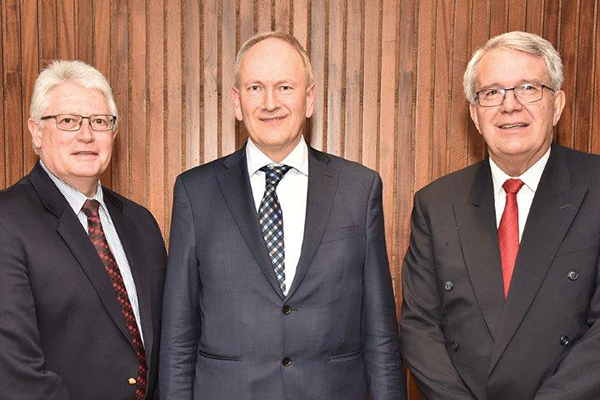Latest News Archive
Please select Category, Year, and then Month to display items
06 November 2023
|
Story MBALI MABOEA
|
Photo SUPPLIED
 The Department of Geography on the UFS Qwaqwa Campus recently played host to the Society of South African Geographers Conference (SSAG 2023), which gathered more than 100 students over three days.
The Department of Geography on the UFS Qwaqwa Campus recently played host to the Society of South African Geographers Conference (SSAG 2023), which gathered more than 100 students over three days.
Fostering academic growth, collaboration, and inspiration among students and researchers in the field of geography, the Department of Geography on the UFS Qwaqwa Campus recently played host to the Society of South African Geographers Conference (SSAG 2023), which gathered more than 100 students over three days.
Following a five-year hiatus, the three-day conference comprised student proposal presentations in different fields: human geography, environment geography, geoinformatics, and physical geography, divided into breakaway sessions over two days. Furthermore, day three of the annual conference included an excursion to the Basotho Cultural Village and Clarens.
The three-day annual student conference focused on different themes presented by two main speakers. The topic of the first keynote speaker, Dr Mahlomola Daemane, General Manager of the SANParks Arid Research Unit, focused on the contemporary conservation, transition, and relevance of science in policy and decision making.
The second keynote speaker was Dr Felicia Akinyemi, a Marie Sklodowska-Curie Research Fellow affiliated with the Institute of Geography at the University of Bern in Switzerland. Her work focuses on the intersection of geoinformatics, global change, and sustainability. Dr Akinyemi focused her talk on the integrative geospatial methods and metrics for sustainable land use. She introduced different techniques and metrics and gave students insight in early-career African research.
Speaking about the success of the conference, Nthebohiseng Sekhele, Geography Lecturer on the Qwaqwa Campus and chair of the organising committee, said, “The local organising committee was also very impressed with the quality of presentations from our postgraduate students in Geography, as well as the robust discussions that happened during the parallel sessions in the two days of the conference. We had a positive response of physical and online participation from many universities across South Africa. We are pleased that we have achieved our goal with this conference, which is to inspire the next generation of geographers.”
Tutu-Jonker Prestige Lecture Series tackles reconciliation
2017-11-13

Prof Rian Venter; Prof Eddy van der Borght, guest speaker from Vrije
Universiteit, Amsterdam; and Prof Fanie Snyman, Dean of the Faculty
of Theology and Religion at the UFS.
Photo: Supplied
The Faculty of Theology and Religion recently hosted the annual Tutu-Jonker Prestige Lecture Series at the Bloemfontein Campus of the University of the Free State (UFS). The purpose of the lecture series is to address modern-day and pressing social challenges from a theological and religious perspective.
With the theme Religions and reconciliation of conflicting identities, guest speaker and Desmond Tutu Chair on reconciliation at the Faculty of Theology: Vrije Universiteit Amsterdam, Prof Eddy van der Borght, spoke about the reformation in the context of shifting European identity formations.
Reconciliation versus social identity
“My focus is on what the Christian concept of reconciliation means for reconciliation in society,” said Prof Van der Borght. He deliberated the global problem of conflict generated by diverse social identities. He also emphasised that religion has huge resources to contribute towards overcoming conflicting identities.
“The theory is that religions know about reconciliation, while in practice it is much more complicated, because often religions are part of the problem of conflict,” he says. He said religions are often the problem in social cultural identities, especially regarding conflict involving different nations, racial, and ethnic groups.
Honouring prominent theologians Tutu and Jonker
The name Tutu-Jonker originates from the two theologians, Emeritus Archbishop Desmond Tutu and the late Prof Willie Jonker, who are both regarded as prominent theologians known for their emphasis on reconciliation in South Africa. The significance of combining the two names is said to bring together two different theological traditions (Anglican and Reformed), cultural groups, and races.
Prof Fanie Snyman, Dean of the Faculty of Theology and Religion, said, “This will also serve the purpose of a welcoming culture at the faculty, embracing diversity and embodying reconciliation.” Both of these theologians received honorary doctorates in Theology from the UFS.